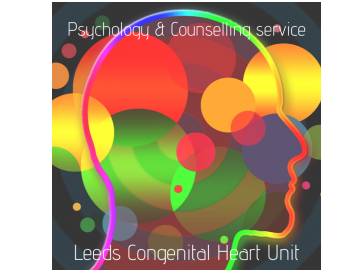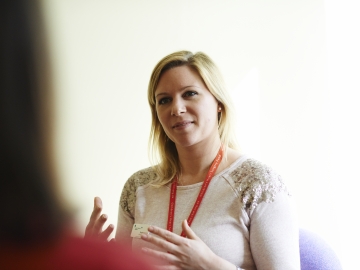Lorem ipsum doler sit amet.
-

What is the Cardiology Psychology & Counselling Service?
Finding out your baby may have a heart problem can be a huge shock for you and your family. It is normal to have lots of thoughts and feelings that can be difficult to manage. These emotions can be different from one person to another and can change from moment to moment. There are no rules about how you should feel and these emotions are a normal and natural way to react to difficult and unexpected news.Whilst these emotions are normal they can feel difficult and at times overwhelming. We have lots of resources with ideas that you can help you cope.
Sometimes people feel that they are really struggling and need some extra help to think through how they are coping. We work with the wider team who are looking after you and baby, to help think about your thoughts and feelings and help you to cope with the challenges ahead.
-
What can we help with?
We see lots of different people, of all ages, with different needs such as;• Coping when you find out about your baby’s heart problem
• Struggling to cope with treatments
• Helping you do the things that are important to you
• Support in preparing for surgery or procedures
• Managing emotions that come from dealing with a heart condition
-

Who can see the Psychology and Counselling Team?
We offer support to anyone who is under the care of any of the Leeds Teaching Hospitals Congenital Cardiac Consultants. We work with all ages including parents who receive an antenatal diagnoses, children and young people and throughout adulthood.Sometimes when we meet with patients and families it can become clear that managing their heart condition is going well, but there are other challenges they are managing. When this happens we may not be able to offer ongoing support, but we can ask other teams to help with other parts of people’s lives that they find difficult.
-
Who is part of the team?
· Dr Sara Matley, Consultant Clinical Psychologist
· Dr Kat Bilbrough, Principal Clinical Psychologist
· Dr Rachel Avison, Senior Clinical Psychologist
· Dr Antonia Cooper, Senior Clinical Psychologist
· Dr Bronwyn Stirzaker, Clinical Psychologist
· Mrs Jayne Slack, Senior Counsellor
· Mrs Sandie Allison, CounsellorSometimes we also have Psychologists in Clinical Training working with us for short periods of time. Our trainees are often on placement with us in their final year of training and are supervised by a Senior Psychologist in the team.
.png?)
-
.png?)
What to expect in an appointment?
When you are offered support we will often start with some assessment sessions. These are to find out about you and the things that you would like to be different. We usually ask about your life, including family, work and interests. We will also talk with you about the things you are finding difficult.We know that some of you may travel a long way, or find it hard to come to appointments in Leeds. We work in lots of different ways to try to make support accessible, including telephone appointments, video consultations and trying to meet when you come in for other medical appointments.
-
Confidentiality
Everything you talk about in an appointment with us will be kept private, unless we feel that you or your family members are at risk. If we are really worried that someone is unable to keep themselves safe, we would have to tell people to make sure there is a plan in place to help. We would tell you if we felt we needed to do this and who we would need to speak to.As we work within the medical team it may be useful to share information with them, but we will always talk to you about this and make sure it’s OK before sharing with other professionals.
.png?)
-
How do I get to see someone from the Psychology and Counselling team?
There are different ways you might meet a member of our team. We work very closely within the wider medical team, so you may meet us in a clinic or on a ward round. At these times we will introduce ourselves and tell you a bit more about what we can offer. We will give you our contact details so that you can get in touch and ask for help if you need it.
Sometimes the other people you see, like the nurse specialists, doctors or the ward staff may think that seeing us would be helpful. They usually discuss this with you and if you agree, they will get in touch with us and ask us to see you.
When someone asks for support, we make sure that we are the right service to offer this. Sometimes there might be a short wait before we can get in touch, but you can contact us if anything changes.
-
Please note, we are not an emergency/crisis service so if you require urgent professional support, request an urgent GP appointment, contact NHS Direct by dialling 111 or attend your local Accident & Emergency.
